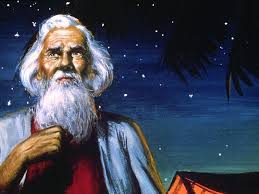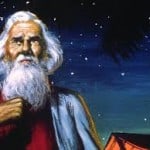As we begin the journey of Avraham and the Jewish people we hear of a promise given to Avraham.
” “And Hashem said to Avram, “Go forth from your land and from your birthplace and from your father’s house, to the land that I will show you. And I will make you into a great nation, and I will bless you, and I will aggrandize your name, and [you shall] be a blessing. And I will bless those who bless you, and the one who curses you I will curse, and all the families of the earth shall be blessed in you.” ( Genesis 12:1-3)
Hashem then caps this blessing with another one that is no less dramatic;
“Please look heavenward and count the stars, if you are able to count them.” And He said to him thus shall be your children {ibid 15:5).
This was a dramatic promise, considering the age of Avraham and the simple fact that he was alone with his family amidst a foreign environment and people. This is a fact that the Torah makes a point of mentioning “And Avram passed through the land, until the place of Shechem, until the plain of Moreh, and the Canaanites were then in the land.”( ibid 12:6)
Avraham was not a man who lived a life of miracles and wonders.
We will read later in the book of Exodus Hashem’s declaration to Moshe;
“I am Hashem. I appeared to Avraham, to Isaac, and to Jacob, as E-l Sha-dai, but by my name Hashem I did not make myself known to them.” (Exodus 6:2-3 )
This verse is confusing as in fact we see that Hashem appeared to all the Patriarchs in a very clear and direct fashion (Genesis 15:7, ibid 26:23-24, ibid 28:13). What then is G-d telling Moshe?
Ramban (Rabbi Moshe Ben-Nachman) maintains that E-l Sha-dai is the name of G-d that represents G-d working within nature. In all of G-d’s dealings with the Patriarchs, He is discovered, revealed and revered with the framework of the natural world. Therefore, G-d is telling Moshe that heretofore G-d did not feel it necessary to break the rules of nature to fully express His message to and through the Patriarchs. Our patriarchs felt the intimacy and compassion of the Hashem aspect in their life and they did not need for Him to be revealed to them in some dramatic or supernatural way.
That may not be the case with Israelites as they were growing out of slavery.
That then is an important concept. Avraham discovered and revealed G-d within the natural world around him. He did not expect and look for miracles and supernatural events.
We read of Avraham’s encounter with Malchizedk , king of Salem
““And Malchizedek the king of Salem brought out bread and wine, and he was a priest to the Most High G-d. And he blessed him, and he said, “Blessed be Avram to the Most High G-d, Who possesses heaven and earth ( Genesis 14:18)
Avraham knew that G-d was not simply relegated to the higher realms of spirituality( the Most High) but was involved in uniting Heaven and Earth. G-d was not to be experienced only as “ the Transcendent One” . He was not simply the All High G-d we would try to connect to by separating from the confines of our physicality. G-d was also the “Possessor of heaven and earth” anticipating relationship with His creation. He was, is and will be very much Imminent, very much in constant relationship with His creation.
How then could this man understand a promise that seemed to be so beyond the realm of the natural?
It is a fact that there are times when the natural, the mundane , and the familiar can become a trap.
Mankind has consistently found itself bound to what is familiar and chained to what is expected. They do not want the little boxes they have built around them to be shattered and are frightened to look out of those boxes. As a result they are afraid to grow.
Avraham’s experience teaches us the antidote to that dilemma
Before Avraham is commanded to enter the land of Canaan we read the following;
And Terah took Avram his son and Lot the son of Haran, his grandson, and Sarai his daughter in law, the wife of Avram his son, and they went forth ( Vayeitzu) with them from Ur of the Chaldees to go to the land of Canaan, and they came as far as Haran and settled there. ( Genesis 11:31)
And then again
And Avram took Sarai his wife and Lot his brother’s son, and all their possessions that they had acquired, and the souls they had acquired in Haran, and they went to go( VaYeitzu LaLechet) to the land of Canaan, and they came to the land of Canaan. ( ibid 12:5)
Then when Avraham is looking for comfort and encouragement he experiences the following with Hashem
“And He took him outside, ( VaYotzeh Oto HaChutza)and He said, “Please look heavenward and count the stars, if you are able to count them.” And He said to him thus shall be your children {ibid 15:5)
The key root word to consider is the word “Go Out- LaTzeit” ( or its derivatives). It denotes a “going out”, or a “breaking through”. Avraham and his family could not taste of the sweetness of the land unless they were able to break away from the patterns, thinking and customs of his father’s house.
Furthermore Avraham could not be open to Hashem’s encouraging prophecy until he broke out of the box he was accustomed to” And He took him outside, ( VaYotzeh Oto HaChutza)” ( ibid).
Hashem asks Avraham to raise his vision to the stars but after taking him out of what he knew, he is asking him to look beyond the stars.
In the world where the stars represented fate , G-d is telling him to look beyond fate with the eyes of faith. There is no more humbling experience then to stand in the darkness and gaze into the infinite universe. G-d is reassuring him that even the infinite becomes a tool to achieve finite destiny.
As the people of Israel look around them and see an ever increasingly hostile world and experience the blind murder lust of an enraged Muslim population the perspective must remain that of Avraham. The ability to see the overwhelming vastness of the universe and remember that each one of us has a destiny and purpose .Such a liberated and refocused vision will return faith and courage to those who have lost it in the midst of the turmoil.
LeRefuat Yehudit bat Golda Yocheved

